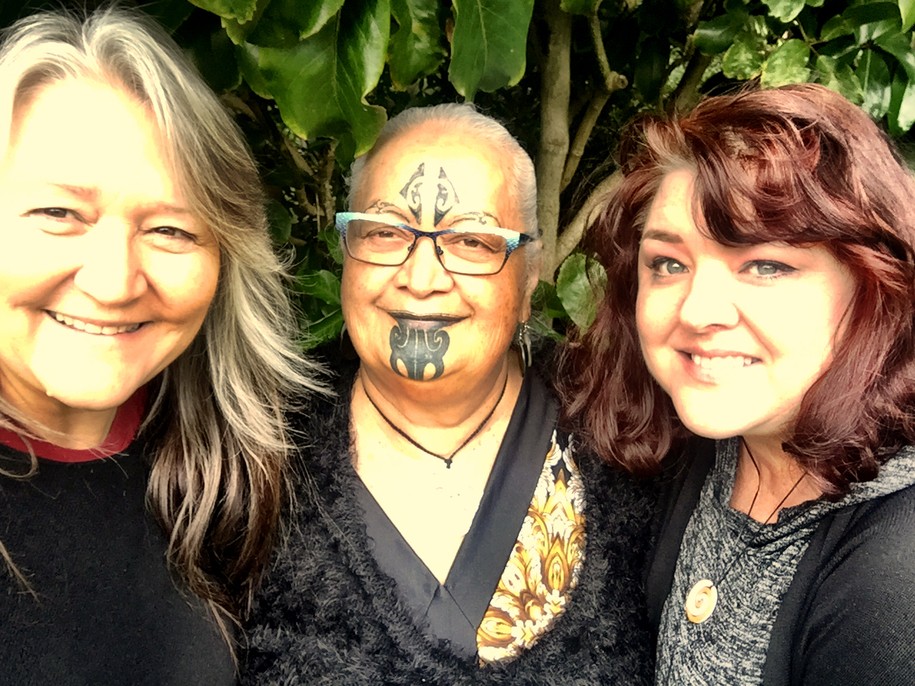 Pennie Opal Plant, Hine Kohu Morgan (Māori elder, artist, poet, and activist) and Shannon Biggs of Movement Rights
Pennie Opal Plant, Hine Kohu Morgan (Māori elder, artist, poet, and activist) and Shannon Biggs of Movement Rights
This is a personal diary of mine and NOT an endorsement by Daily Kos.
Such satisfying news. I’ve been selected to be part of an Indigenous Delegation to travel to New Zealand. This is an exciting opportunity to visit my Māori brothers and sisters. I’ve had a childhood dream of visiting New Zealand some day. I will be fully funding myself on this trip but other invited Native delegates need financial assistance. Below you can read about this delegation’s goals and a little background on previous accomplishments.
Published with permission from Movement Rights:
KO TE AWA KO AU “I AM THE RIVER”
2018 FACT-FINDING DELEGATION TO AOTEAROA
INTRODUCTION
In 2017, New Zealand’s Māori iwi (tribes) and Crown government worked together to recognize the legal and holistic “personhood rights” of entire river systems, former National Parks, and other ecosystems. These agreements are groundbreaking, offering an entirely new vision for environmental protection based on Indigenous cosmology. Movement Rights has unique access to bring a high-level Indigenous and Rights of Nature fact-finding delegation to Aotearoa (New Zealand’s north island) in April/May 2018 to understand their victory, and showcase how it can be translated globally as a strategy for climate resilience and biodiversity.
ORGANIZATION DESCRIPTION
Mission/Main goals: Movement Rights seeks to advance the rights of communities, Indigenous peoples and ecosystems. Based in California, we work locally and globally to shift law and culture toward living in balance with natural laws. We confront unjust laws that protect destructive corporate interests in the following ways:
- Empowering communities to write new rules. We provide organizing and legal support to communities confronted by harmful projects. We assist them to pass new laws that place the rights of residents and nature above corporate profit.
- Movement building for the rights of nature. Through savvy media campaigns, education legal support and organizing we are a leading international advocate for recognizing the legal standing of nature.
- Advancing Indigenous rights and traditional knowledge. Indigenous peoples are the defenders of the most diverse places on Earth. As such, they have a leadership role to play in the transformation of our culture and law toward ecological balance. Our organizing, research and reports highlight this.
RECENT SUCCESS
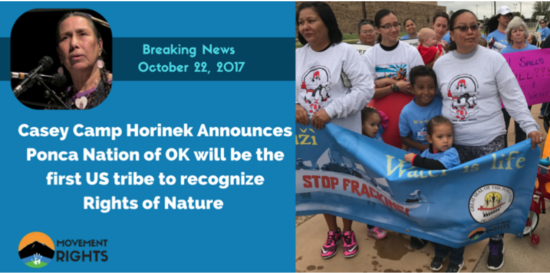 Casey Camp Horinek announces Ponca Nation of Oklahoma will be the first U.S. tribe to recognize Rights of Nature
Casey Camp Horinek announces Ponca Nation of Oklahoma will be the first U.S. tribe to recognize Rights of Nature
In partnership with Movement Rights, the Ponca Nation of Oklahoma is poised to make history as the first tribe in the US to recognize rights of nature in tribal law. With our assistance over the last 2 years, in October 2017 the Ponca tribal council unanimously agreed to recognize legal standing for tribal lands to be free from fracking and injection wells. The law was effective in January 2018.
Currently, Rights of Nature defines legal rights for ecosystems to exist, flourish and regenerate their natural capacities. These laws challenge the status of nature as mere property. While not stopping development, the recognition of legal standing for the natural world stops the kind of development that interferes with the existence and vitality of ecosystems.
Owing to fracking, Oklahoma has become the “earthquake capital of the world”. The Ponca tribe, located in Ponca City, OK—at the center of the state’s fracking activities, oil pipelines and refineries—has suffered from industry-related cancers, respiratory diseases and deaths. Their water is no longer drinkable and they must buy water from the city. (Watch a short video of Casey and Movement Rights Day of Action.
ABOUT THE KO TE AWA KO AU DELEGATION
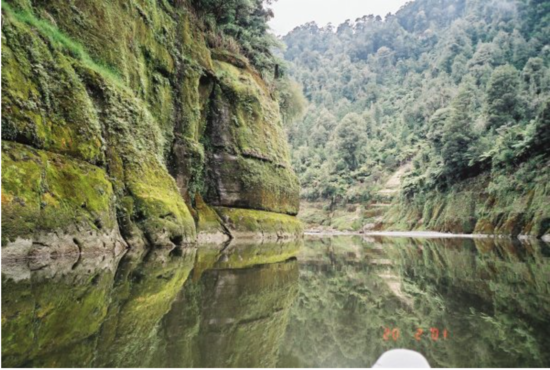
Background: In October 2016 Movement Rights’ co-founders visited Aotearoa to learn from Māori iwi (tribes) and the Crown government, who together have passed revolutionary legislation for the rights of Indigenous peoples and the protection of the Earth. Before our trip, the Te Urewera and Whanganui River Agreements were little known in the US. Then in March 2017, only 4 months after our visit, the agreement for the Whanganui River was officially signed into law, bringing more interest, but little in terms of understanding of its potential global impact. The watershed of the Whanganui River—from the mountains to the ocean—was legally recognized as a holistic, spiritual entity, and the Māori iwi are bringing together iwi and the wider community in a strategic healing and new governance process based on long term environmental,
social, cultural and economic health and well being of the river.
The Crown government of New Zealand has formally apologized to the Māori iwi and the river for its crimes, and $110 million has
been funded for redress and new governance structures.
The Whanganui River Agreement was based on a similar agreement made between the Tuhoe iwi and the Crown in 2015, that released a mountain ecosystem (formerly known as Te Urewera National Park) from Crown ownership, and like the Whanganui River, Te Urewera is no longer property owned by anyone. During our advance delegation, we made strong relationships with the Māori iwi we visited (about 30 iwi were interviewed) and learned why they do not see these agreements as environmental protections, but rather as a freeing of their cultural identity which has been bound by Crown legislation over their ancestors Te Urewera and the Whanganui River. They see these agreements as first steps toward their total sovereignty as iwi, which they predict will result over the next 20-30 years. Equally fascinating and hopeful, the Crown Treaty negotiators agreed that sovereignty was the likely future outcome of these agreements, in addition to the way in which these agreements will invite Pakeha (white New Zealanders) into Māori cosmology, understanding and practice. For more see our recent article in the Earth Island Journal.
Background on Legal Rights of Nature and the Role of Indigenous Cosmology:
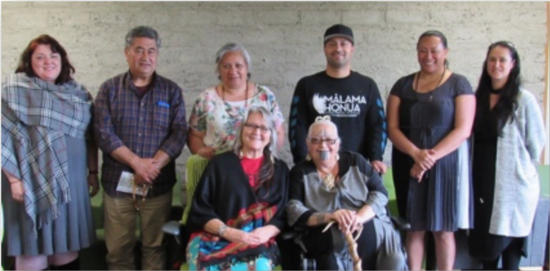 Tamati Kruger, pictured second from left during the 2016 advance delegation
Tamati Kruger, pictured second from left during the 2016 advance delegation
“Land is not property. The challenge was convincing the New Zealand Government of that. At first the government thought they’d offer us a seat at the table, seats on the Parks Commission or something. That was never going to happen.”
~Tamati Kruger, chief negotiator of Tūhoe’s ground-breaking Treaty settlement.
In the modern world humanity is removed from nature. Human law almost everywhere defines “nature” as property to be owned, commodified and destroyed at will for profit. Most of the destruction of the Earth is sanctioned by law—from blowing the tops of mountains for coal; to fracturing the earth for oil and natural gas; to clear cutting the Amazon and displacing Indigenous communities. A world without a living knowledge of its spiritual relationship and responsibilities to the creative principles of the natural laws of Mother Earth, results in our planet becoming mere property, to be owned and sold. Nearly everywhere, the political and legal frameworks protect the ownership of nature. Climate change itself is the Earth’s demand for human system change; it is a wake-up call to shake off old ways that got us here, and to create vibrant local living economies respectful of the living cycles of Mother Earth. It means shifting the legal landscape that has propped up industrialization by treating ecosystems as sacrifice zones for profit.
Around the world, Indigenous cosmologies provide a context for a different relationship to the Earth. One that is ethical, spiritual, reciprocal and nurturing. The movement for Rights of Nature provides a western legal framework for this Indigenous understanding of how to live not as owners of nature, but as part of it. In the last decade, five countries and dozens of communities have passed laws recognizing “legal standing” for ecosystems. And yet, even as this movement grows, we have much to learn about how to make the transition from an economy built on treating the Earth as property, to one that recognizes rights for the natural world.
How does that transition happen? What happens when a river is no longer property? How do we shift environmental regulations, business practices, and culture? New Zealand is leading the way forward, and learning from their processes on the ground is key to a true global revolution.
Delegation Outcomes and Timeline:
“This river isn’t just water and sand. It is an ancestral being with its own integrity. This river is not the river that has been contended by the crown, that exists in compartments, its bed and its waters. It’s an indivisible whole that includes iwi so this concept of legal personhood is the nearest legal approximation to the way in which we relate to our people as being inextricably entwined to it and can never be alienated from it.”
~Gerrard Albert, chair of Ngā Tāngata Tiaki o Whanganui.
“What has been put in place is a very forward-looking framework. I think we’re going to see a springboard for this type of thing. People are already taking next steps voluntarily.”
~Lead Crown negotiator, Paul Beverley
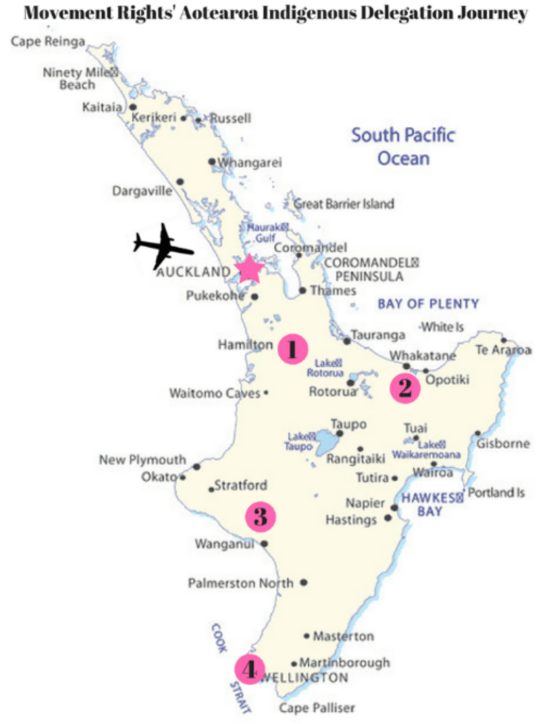
Movement Rights and our Māori partners are leading a 10-day, April/May 2018 fact-finding delegation. We will visit 3 key Māori iwi and Parliamentary officials and lawyers involved in this work. We seek the sharing of wisdom between Māori and other Indigenous peoples. We also seek to advance the work and thinking of Rights of Nature movement and Indigenous Rights advocates globally. Delegates have been selected for their specific expertise; willingness to share and amplify their experiences and contribute to a visible rise in media, public education and legal scholarship. Outcomes include:
- Sharing of knowledge between Māori and Indigenous delegates that will provide a meaningful basis for advancing Indigenous Rights in other nations/tribal communities;
- A Report of Findings that will include insights from all delegates and will form the basis of “next steps” for the Rights of Nature movement and Indigenous sovereignty struggles (July 2018);
- 3 or more new law journal articles in the US, Australia and elsewhere produced by delegates and New Zealand legal scholars.
(June-December 2018) - 1-3 video documentary “shorts” exploring the learnings of delegates and interviews with the Māori as permitted.
(By August 2018) - 2019 educational and organizing events in the US to build support for this model.
YOU CAN SUPPORT THIS DELEGATION AND ITS MISSION
The funds raised here will help cover the cost of flying these delegates to New Zealand to work toward world-wide clean air, water, soil and a healthy future for our next generations.
There are three levels of gifts for contributions which can be seen when you click “Donate Now“. Or, you can make a tax deductible contribution: Click here (14% of tax deductible contributions will go toward fees)
 |

|
 |
Of course, amounts smaller than designated above add up beautifully and are greatly appreciated.
I am one of the delegates but I will be fully funding myself. I look forward to documenting this trip and reporting back to you upon our return.
Can’t donate? Please share with your personal networks instead.
Well wishes accepted, also!
Leave a Reply